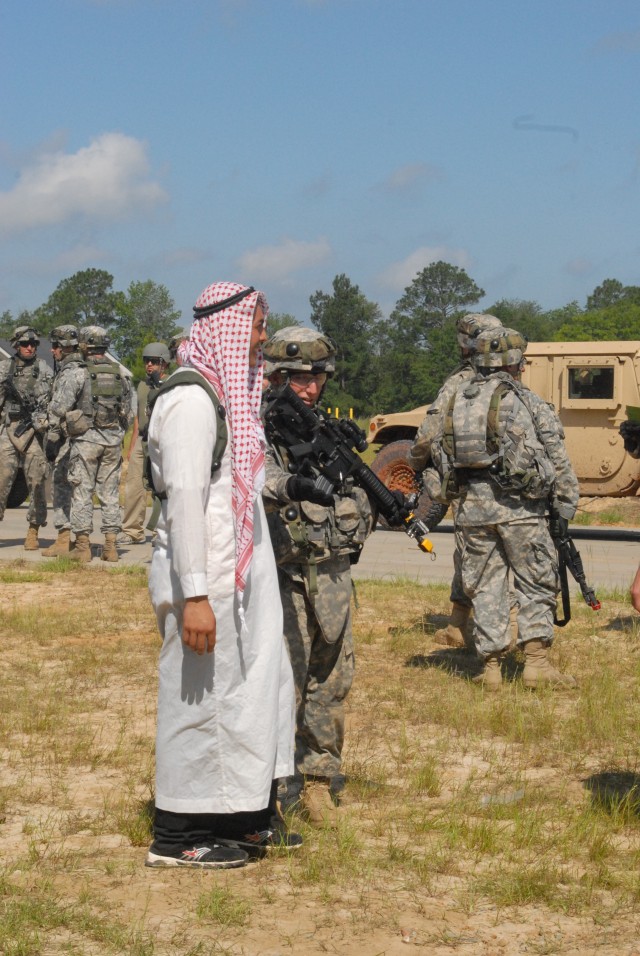FORT STEWART, Ga. - "My people are free," Abraham al Mawlood of Basra, Iraq said. "My country's history will ask, 'Who gives this country freedom'' America is the answer. History will be written forever and Americans will get the credit."
After a return to Iraq in 2005 and 2006, al Mawlood is pleased with the freedom that Iraqi citizens enjoy. They voted to elect officials and enjoy freedom of press and speech for the first time. Al Mawlood expressed appreciation for the Soldiers. He is also proud to work with the 3rd Infantry Division as an Iraqi linguist during training exercises to prepare Soldiers for deployment.
The training began at midnight, June 2, when the western side of Fort Stewart became the fictional country, Fasalia. Members of the 2nd Heavy Brigade Combat Team participated in training that introduced them to cultural and situational challenges they may face while deployed.
As the Bradley Fighting Vehicle entered the capital city of Moslin, the sound of gunshots and screams filled the air.
"Why are you here' Why'" shouted role-play Iraqi citizens.
The bodies of two young men laid on the ground as Iraqi citizens cried out to Allah over the dead bodies. Minutes earlier, a suicide bomber detonated a bomb in the town's cafAfA, causing causalities and creating uproar in the center of the town.
This portion of the exercise tested the Soldiers' ability to respond to a suicide bomber and maintain crowd control. Second BCT observer-controllers urged Soldiers to show respect and allow the Iraqi forces to lead while keeping control of the situation.
Less than 10 feet away from the angry crowd of citizens, the battalion commander and local mayor worked on peace negotiations in the mayor of Moslin's office.
"We are here to help," said Lt. Col. Ross Coffman, battalion commander, 2nd HBCT. "We are here to support you. We will work together and become like Family to secure this great nation."
Later, the men exited the building and the mayor addressed his citizens. This completed one part of the training objective, where the goal was to empower Iraqi forces to run the country as American troops depart.
Soldiers are trained for proper response in situations, including suicide bombers, snipers, grieving widows, Improvised Explosive Devices, wounded Soldiers, mosque raids, propaganda and more.
"The purpose of the training is to validate and certify our company," said Maj. Michael D. Jason, 2nd HBCT operations officer. "We don't want to introduce our Soliders to a new situation while being shot at (while deployed)."
After training, Soldiers are familiar with scenarios they could encounter in the battlefield and ready to respond.
"We want our Soldiers to think and be agile enough to respond properly to the situation," said Col. Chuck Sexton, commander, 2nd HBCT. "Successful training allows Soldiers to react as if in a contingency area."
Many Soldiers believe the real world training accomplishes this goal by providing opportunities to interact with the Iraqis. Training is vital - whether it is a young Soldier who is deploying for the first time, or a veteran Soldier deploying for the fourth time.
"There is no Soldier who goes overseas without being properly trained," said Sgt. 1st Class David L. Denson, platoon sergeant, 2nd HBCT.
"Training is preparing me for deployment," Pvt. Robert Wagner, 1st Battalion, 64th Armor Regiment, 2nd HBCT agrees.
At 23 years old, it is Pvt. Wagner's first deployment, but he is confident in the training and has learned that you must listen to your team leaders to be effective.
For new Soldiers, this training serves as a complete immersion into the tactical situation. For veteran Soldiers, it is an opportunity to learn about new situations that were not present the last time they deployed. Training prevents Soldiers from becoming complacent; they must continue to learn how to react under all circumstances.
"We want to teach new Soldiers to remain calm, think clearly and rely on leadership," Col. Sexton said.
The training exercise is also designed to place leadership in stressful situations that require them to take action.
"Get in there, get a plan and get going," Brig. Gen. Patrick Donahue, 3rd ID deputy commanding general for Maneuver, said to battalion leaders after witnessing peace negotiations during the exercise.
The importance of training isn't the only thing that the Soldiers agree on. They realize the situation in Iraq has changed from force-on-force to security training in an urban environment.
"We are in a transition from a War Army to a Peace Army" said Staff Sgt. Paul Boothe, 1st Battalion, 9th Field Artillery, 2nd HBCT. "It's a big change."
al Mawlood witnessed this change firsthand.
"I see change; everything says change," al Mawlood said. "Before, Soldiers just attacked. Now they are interacting with the people. They are doing a good thing."
The training highlighted the work 3rd ID Soldiers are doing to prepare for deployment.
"I can't describe my happiness," said Saad Aljanaby, a refugee from Baghdad, who has served as a linguist in the U.S. for the past nine months. "All of the Soldiers are very serious about their job. We work side-by-side to minimize casualties on both sides."
This exercise is part of many that Soldiers participate in to prepare for deployment. The objectives and different scenarios add to the effectiveness of the Soldiers' preparation for deployment.
"Good training makes a guy like me happy," said Maj. Jason.


Social Sharing